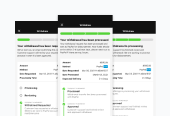

CLIENT
Caesars Sportsbook
DISCIPLINES
Product Design, User Research
INFO
Rebuild the search experience to serve mobile bettors during key sports moments—making it fast, trusted, and actionable.
Initial Problem
Search had become such a poor experience that we intentionally hid it from the main navigation. Users couldn’t find what they needed, trust was low, and the results weren’t relevant or bettable.
This led to:
- High drop-off rates
- Zero momentum from VIPs and frequent bettors
- No presence across key parts of the app (live, home, events, etc.)
Discovery
To inform the redesign, we conducted a competitive audit across six major sportsbook apps—FanDuel, DraftKings, Fanatics, BetMGM, Bet365, and ESPN Bet. The best experiences shared several traits: visible and accessible search, typeahead suggestions, support for abbreviations, and the ability to bet directly from search results. FanDuel and DraftKings stood out for their fast, actionable flows.
In contrast, Caesars’ search was almost invisible, lacked relevance, and didn’t support bettable results, live context, or shorthand queries. We also discovered through user interviews that VIPs treat search like a shortcut, while casual users expected more guidance and flexibility.
Although analytics were split across platforms, we estimated that around 15% of users engaged with search, and most dropped off after entering a query—highlighting the lack of trust and utility.
These insights confirmed that we needed to rebuild search from the ground up, focusing on visibility, speed, relevance, and direct betting actions.
Internal Audit, Analytics & User Insights
We ran a full audit of the existing search experience and found major issues: it was hard to find, returned irrelevant results, and didn’t support abbreviations, typos, or direct betting actions. It lacked live context like scores or event status, making it feel disconnected from the rest of the sportsbook experience.
Quantitatively, we estimated around 15% of users engaged with search, though usage data was split between Algolia and GA, making exact measurement difficult. Drop-off after entering a query was high—confirming that results weren’t meeting user expectations.
In qualitative interviews, VIP users described search as a tool for speed and precision, while casual bettors wanted help surfacing the right terms and bets. Both groups expected more intelligence—whether through typeahead, abbreviation support, or relevant betting options shown immediately.
Phased Rollout Strategy
We approached the search redesign in three distinct phases, each shaped by technical constraints, user needs, and opportunities to build trust gradually. Design decisions in each phase balanced utility, speed, and future scalability.
Phase 1 – Rebuild the Foundation
What we launched:
- Introduced a new, mobile-friendly search UI
- Deep-linked users to the event page and market, but no direct betting from search
- Prioritized live and upcoming games in results
- Soft-launched to a limited audience for early validation
Design impact:
- Focused on clarity and readability to reset user expectations
- Used lightweight, modular components for flexibility in future iterations
- Emphasized relevance over depth—delivering the right results, not all results
Phase 2 – Add Utility and Speed
What we launched:
- Added search history, and loading skeletons
- Enabled bettable buttons for key markets directly in the results
- Introduced live scores and more structured result groups (e.g., team, market, event)
Design impact:
- Made search feel more intelligent and responsive
- Reduced user effort by supporting shortcuts and common behaviors
- Created interactive, tappable result cards for fast betting flows
Phase 3 – Expand Visibility and Embed Everywhere
What we launched:
- Rolled search out to the home screen
- Released globally to all users
- Embedded search across key app surfaces (home, live, event, betslip)
Design impact:
Treated search as a primary nav pattern, not a secondary tool
Elevated visibility with persistent placement and proactive prompts
Balanced utility with restraint—avoiding clutter or overloading results
Established a framework for future personalization and refinement
Final Phase 3 Designs
This project transformed search from a buried, ineffective feature into a reliable and trusted part of the Caesars Sportsbook experience. It now supports thousands of daily users and helps bettors quickly find and act on the markets that matter most.
The redesign was never about adding flash. It was about solving real problems within real constraints. Working within the limits of a legacy retail index, disconnected analytics systems, and evolving business priorities, the solution was delivered through a phased, user-centered approach. Each step focused on restoring trust, improving performance, and making search feel intelligent, responsive, and fast.
While search is not currently positioned as a core growth lever within the organization, it now operates as a stable, scalable tool that supports both casual users and high-value bettors. The foundation is in place for future improvements such as personalized suggestions, deeper market integrations, and smarter navigation patterns.
This work is an example of what thoughtful product design can do: create meaningful impact through structure, iteration, and clarity—especially when the path forward requires navigating complexity, not avoiding it.







